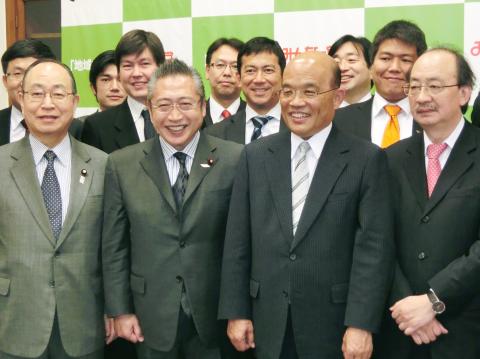The Democratic Progressive Party (DPP) yesterday rejected Beijing’s criticism of the party’s “flattery of Japan” over the Diaoyutai Islands (釣魚台) dispute, saying that China’s provocative moves in the region are what should be condemned.
China’s Taiwan Affairs Office spokesman Fan Liqing (范麗青) on Tuesday said DPP Chairman Su Tseng-chang (蘇貞昌), who is scheduled to return to Taiwan today after a five-day visit to Tokyo, displayed “a lack of national pride” with his “flattery” of Japan on the territorial issue.
“The DPP has its own views and assessment about Taiwan’s national strategic interests. While Taiwan and Japan both claim sovereignty [over the Diaoyutais], they also share the common interests of maintaining peace and stability in East Asia,” Su said in Japan.

Photo: Lee Hsin-fang, Taipei Times
“The most urgent task at hand is how to secure fishing rights in the region, where Taiwanese have been fishing for hundreds of years,” Su added.
Su and the DPP delegation visited the ruling Liberal Democratic Party’s (LDP) think tank yesterday.
The DPP chairman urged both sides to resolve the issue of fishing rights in waters near the Diaoyutais as soon as possible through peaceful dialogue and again highlighted the friendship between people in the two countries.
DPP headquarters offered a more straightforward counterattack to China’s criticsm, with spokesperson Lin Chun-hsien (林俊憲) saying that the DPP has always called for resolving the dispute through bilateral negotiations and that the party “opposes China’s intentional provocation in waters around the Diaoyutais, which are known as the Senkakus in Japan.”
Beijing’s provocation has created tension and instability in the region, he said, adding that Taiwanese would not accept Beijing’s attack on the DPP.
China has no grounds to comment on Taiwan’s affairs when it oppresses Taiwan’s international space, threatens to take Taiwan by military force and has more than 1,000 ballistic missile aimed at Taiwan, Lin said.

Taiwan is stepping up plans to create self-sufficient supply chains for combat drones and increase foreign orders from the US to counter China’s numerical superiority, a defense official said on Saturday. Commenting on condition of anonymity, the official said the nation’s armed forces are in agreement with US Admiral Samuel Paparo’s assessment that Taiwan’s military must be prepared to turn the nation’s waters into a “hellscape” for the Chinese People’s Liberation Army (PLA). Paparo, the commander of the US Indo-Pacific Command, reiterated the concept during a Congressional hearing in Washington on Wednesday. He first coined the term in a security conference last

A magnitude 4.3 earthquake struck eastern Taiwan's Hualien County at 8:31am today, according to the Central Weather Administration (CWA). The epicenter of the temblor was located in Hualien County, about 70.3 kilometers south southwest of Hualien County Hall, at a depth of 23.2km, according to the administration. There were no immediate reports of damage resulting from the quake. The earthquake's intensity, which gauges the actual effect of a temblor, was highest in Taitung County, where it measured 3 on Taiwan's 7-tier intensity scale. The quake also measured an intensity of 2 in Hualien and Nantou counties, the CWA said.

The Overseas Community Affairs Council (OCAC) yesterday announced a fundraising campaign to support survivors of the magnitude 7.7 earthquake that struck Myanmar on March 28, with two prayer events scheduled in Taipei and Taichung later this week. “While initial rescue operations have concluded [in Myanmar], many survivors are now facing increasingly difficult living conditions,” OCAC Minister Hsu Chia-ching (徐佳青) told a news conference in Taipei. The fundraising campaign, which runs through May 31, is focused on supporting the reconstruction of damaged overseas compatriot schools, assisting students from Myanmar in Taiwan, and providing essential items, such as drinking water, food and medical supplies,

New Party Deputy Secretary-General You Chih-pin (游智彬) this morning went to the National Immigration Agency (NIA) to “turn himself in” after being notified that he had failed to provide proof of having renounced his Chinese household registration. He was one of more than 10,000 naturalized Taiwanese citizens from China who were informed by the NIA that their Taiwanese citizenship might be revoked if they fail to provide the proof in three months, people familiar with the matter said. You said he has proof that he had renounced his Chinese household registration and demanded the NIA provide proof that he still had Chinese